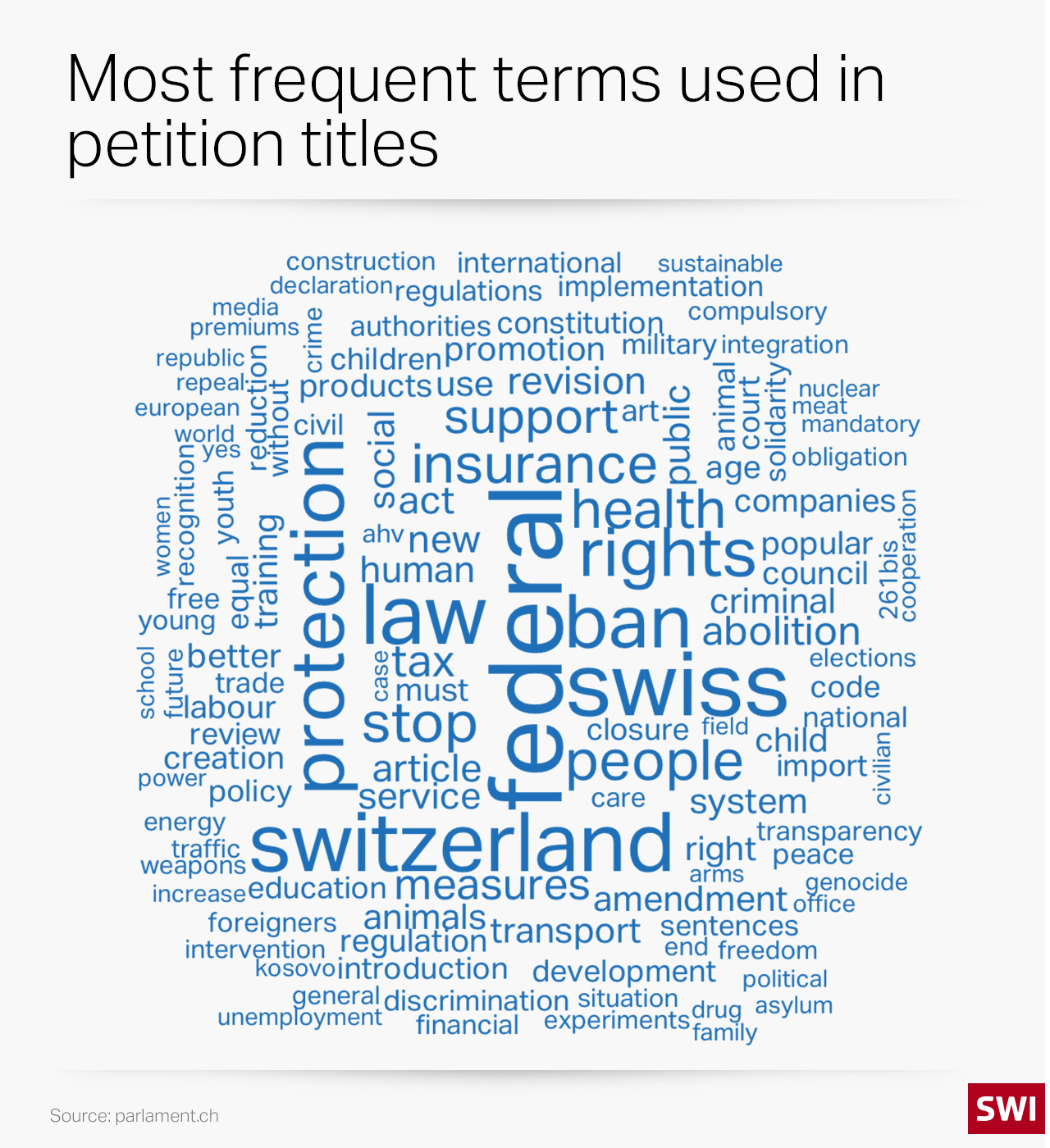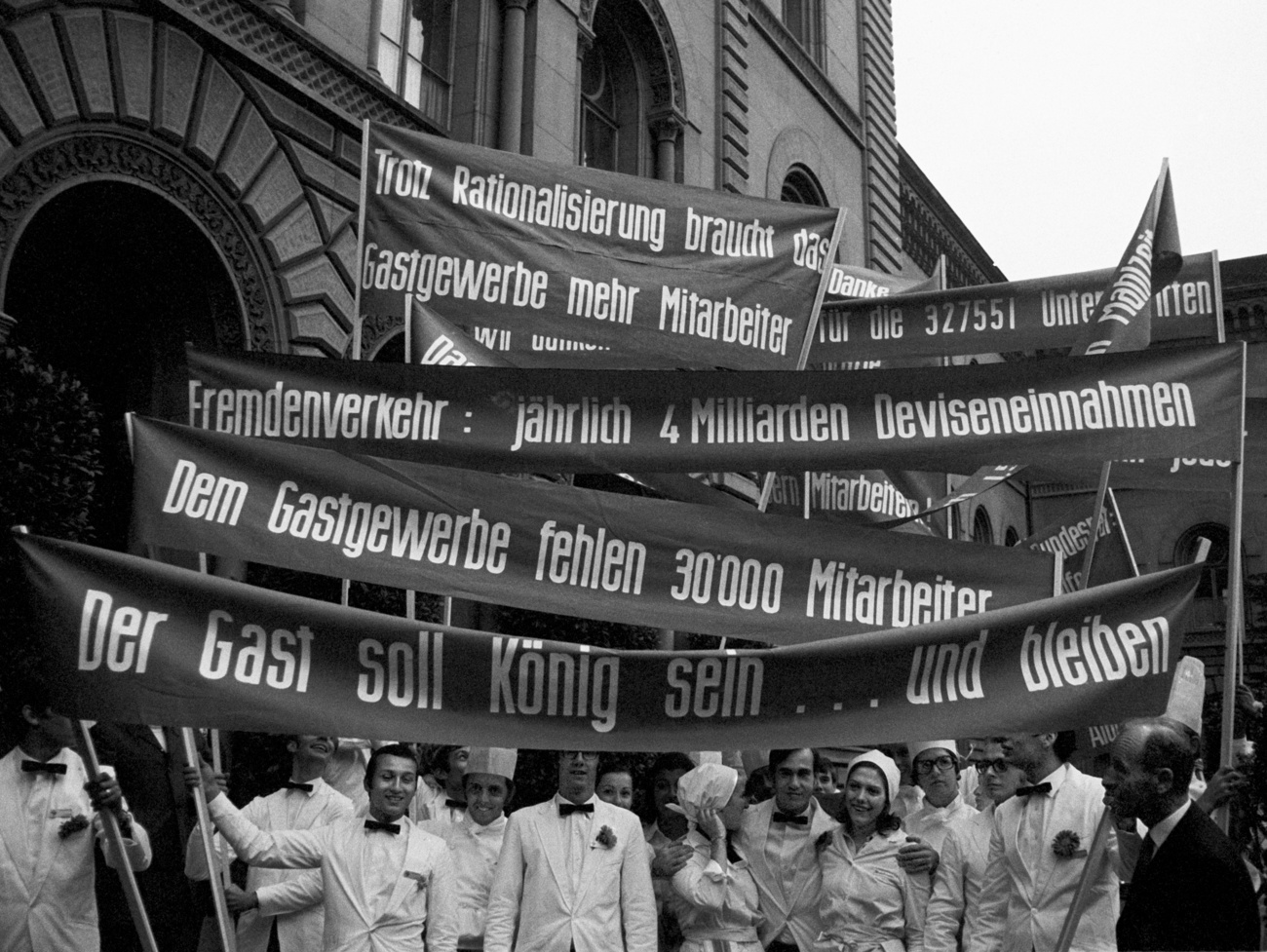Petitions: seemingly toothless yet fundamental

Petitioning is Switzerland’s oldest democratic tradition. Several thousands of signatures are still submitted to the parliament as petitions every year. A closer look at the database reveals how petitioners and motives have shifted over time.
The right to petition goes back at least to when Egypt built its pyramids. Workers hired to trudge blocks weighing several tons petitioned for better working conditions. The practice survived through the centuries, as subjects petitioned their Emperor or King, asking for the redress of their grievances. The right was inscribed in the Swiss constitution in 1848, the year Switzerland was created as a federal state.
In contrast to the referendum and popular initiative (implemented in 1874 and 1891), petitions don’t trigger a nationwide vote, and don’t require a formal answer by the government.
- Popular initiative: citizens requesting an amendment to the Swiss constitution have to collect at least 100,000 signatures of Swiss people of age within 18 months. If parliament decides that the initiative is valid, it’s put to a nationwide vote.
- Referendum: citizens disagreeing with a decision of parliament can gather at least 50,000 valid signatures within 100 days of the official publication of the act, which is then submitted to a nationwide vote.
- Petition: anyone can start and sign a petition, on any topic, and no minimum number of signatures are required. There is no predefined form, it doesn’t trigger a vote and the authorities must only acknowledge the reception, but aren’t required to respond.
The apparent lack of effectiveness of this tool, not linked to any legally binding commitments, has not hindered its popularity. Swiss authorities have been receiving and treating a large number of petitions in the last two decades. With as few as 9 in 1999 and as many as 68 in 2012, topics can vary from requesting measures against an alleged cormorant invasions to the clarification of Switzerland’s position on human rights abuses abroad.
Who files petitions?
The majority are submitted on behalf of groups and organisations, which range from Bible groups to small animal rights associations and powerful trade unions. The Youth Parliament which represents 12-30 years old, alone submitted around 150 petitions since it was founded in 1991. Often too young to participate in politics through other channels, the 200 participants of the annual youth session hand over many of their demands, which they formulate over several days in the House of Representatives, as petitions.
Many individuals too initiate petitions – mostly men. Some of them have already used the instrument several times to make their voices heard in parliament. One of the most prolific voices submitted 22 petitions in his name.
Maggie Blackhawk, assistant professor at the University of Pennsylvania, studied the profile of petitioners to the United States Congress until 1950. The results of her research are intriguing. They show that in the US women and minority groups were petitioning regularly.
“The petition process historically (in the world) was a space that wasn’t seen as majoritarian. It was a counterpoint to the right to vote, an addition to it, a space for people at the margins to engage in the law-making process without having to consider their own political power” she notes. “It sounds like that representational mechanism is lost in modern day Switzerland.” A read through by SWI swissinfo.ch of petitions filed over the past 30 years shows that there aren’t many foreign names among petitioners.
Before they were granted voting rights in 1971, Swiss women were active petitioners, and even filed a petition asking for their suffrage rights in 1929. Today, women are rarely the sole authors of petitions. With four submitted in her name, Regula Heinzelmann, blogger and author, is the woman who filed the most petitions in Switzerland over the past 30 years. “If I have the impression that a topic (that I mention on my blog) is well received, I feel obliged to publicly represent the opinion of my readers, for example with a petition,” explains the retired lawyer. “After all, I’m retired, so I can do some voluntary work.”
Because they allow anyone – regardless of age, nationality, or voting rights – to access the political debate, petitions not only appear as a fundamental freedom of expression tool, but also possibly as democracy in its purest form. In the US constitution, on which the Swiss fundamental law is based, the right to petition is explicitly mentioned in the First Amendment, commonly known to ensure freedom of expression. The right to vote though isn’t explicitly mentioned. “That should help us see petitioning as a complement to the right to vote and on par with it, rather than something that’s subsumed to it” says Blackhawk.
Heinzelmann is aware that petitions often do not have political consequences. To avoid this impasse, she tries not to start a petition for every issue, but instead follows the parliamentary programme. For Social Democrat co-president and parliamentarian Cédric Wermuth, timing is key. “In what feels like 80% of cases, the problem is not that parliament doesn’t want to deal with the issue, but that the petition comes at a time when the parliamentary process is too far advanced.”

Wermuth himself is one of the few active parliamentarians whose name appears as the author of a petition. But he doesn’t want to see himself as an exception: in fact many organisations that start petitions are backed by active politicians.
Numbers count
Historically an individual act, petitions are nowadays submitted with hundreds of thousands of signatures: in February this year a request not to mess with women’s retirement plan received 314,000 signatures. In June 2019, 340,000 people signed a petition launched by the Swiss pharmacists’ association calling on the government to drop its cost-saving plans and boost basic medical services instead.

If there’s no minimal amount of signatures required, a petition signed by many will probably weigh differently than an individual letter. “It’s another way of generating pressure, like saying if you do that now, there are lots of people who will disagree with you.” explains Wermuth. “This can jeopardise a bill, as you’re showing that a decision might be challenged by a referendum. A petition can be a preliminary stage to a referendum.”
Because signatures for referendums or initiatives have to be collected in a short amount of time, finding a network of like-minded people is crucial to the success of the process. Signing a petition, whether online or on paper, can contribute to the creation of such a network. “For certain issues, if it’s about people seeing and talking about the issue. If you want to build a community as a next step, petitions are very worthwhile.” confirms Daniel Graf, founder of WeCollect, a Swiss online platform for signature collection. Nevertheless, his platform WeCollect does not collect signatures for petitions: “Compared to initiatives and referendums, there is often a lack of lasting impact because petitions rarely trigger political processes.”
Filing a petition can also turn into a mediatised event with the aim of attracting attention. Petitioners pose in front of all the signatures they’ve collected, and often make a point of catching the public’s eye, be it with colourful masks and flags or animal stunts.
Petitioning around the world
The right to petition isn’t a Swiss peculiarity. Many countries have it inscribed in their own constitutions. The European Parliament also allows anyone living in a member country to submit a petition which must concern one of the 44 EU policy areas. The requirements and effectiveness of petitions might however vary among countries: in Britain a petition has first to be signed by 100,000 before it gets considered for a debate in Parliament. In Austria it has to be backed and submitted by a member of parliament before it can be discussed.
In some countries, the right to petition in theory and in practice might differ. In China, petitioning is a tradition dating as far back as the beginning of the Chinese empire, where the central power would historically be able to redress grievances that local authorities had dismissed. However, investigative reports have shed a light on illegal businesses that aim at preventing citizens to report local injustice to the central government through violence and intimidation.
The democratic value of petitions
“The importance of the right to petition is fundamental to the legitimacy of the democratic framework and the democratic process. Because if you have a democracy that only represents some people, yet regulates all of these other people without giving them any form of representation, that’s problematic to me as a matter of democratic process” says Blackhawk. “That doesn’t sound like the demos of all the people. It sounds like some of the people regulating other people.”
Nowadays, in Switzerland, petitions mainly serve as campaign vehicles for established politicians or Swiss men. But the potential remains: petitions are still open to all.

In compliance with the JTI standards
More: SWI swissinfo.ch certified by the Journalism Trust Initiative














Join the conversation!